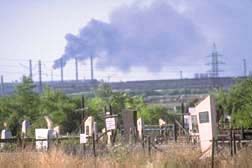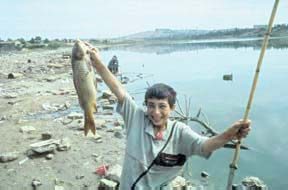|
Autumn 1998 (6.3) Transitioning to a New Mentality by Urkhan Alakbarov
One can speak in broad terms about Azerbaijan's transition, but in reality it's not as simple as "moving from a centralized government to a market economy." It's much more complex and needs to be conceived through a different, more elaborate model. Here we view this process of transition through the eyes of a scientist, Azerbaijani geneticist Urkhan Alakbarov. Photos: Betty Blair
When we speak of transitions, we must keep in mind that the world, in general, is always in transition. Even the Soviet period was a transition. Today in Azerbaijan, the process of transition is much more complex and the rate of transition is much faster than ever before. We are not simply transitioning from a centralized economy to a market economy, as is usually stated, or from totalitarianism to democracy. We are in the midst of transitioning to a new mentality. I'm not speaking just about the mentality of a market economy nor of the mentality of an open society conceived in primitive terms. This new mentality means creating new systems to keep up with the break-neck pace of technology, new strategies for helping our most talented people stay in Azerbaijan, as well as new models of thinking about the environment and the impact we are making upon it.
Catching Up In order not to eliminate our chances for future competition, it's necessary to avoid development that uses outdated technology, equipment and ideology. Of course, it's necessary to provide good conditions for business relations now but we must think long term about the future, too. We need to look beyond current technology, instead of imitating developed countries. By the time we reach the stage that developed countries are at now, they'll be another step ahead of us. It becomes a vicious cycle. We must anticipate the next step of development and aim for that level directly. Likewise, we can't live in isolation anymore. Individual countries share common problems: ecological problems, economical problems, moral problems, problems regarding the use of natural resources and problems concerning overpopulation. As we move toward a union of the world, we need to decide how we all are going to contribute to the whole, how we all can help to solve these problems. We need to think beyond the borders of our small country and our internal problems - the war, the military occupation of nearly 20 percent of our territory and the problems of malnutrition amongst nearly 55 percent of our children.
Polluted air near Baku's city dump where garbage is burned. "Gene drain" is different from "brain drain," which happens when people leave the country to find work, and then eventually return back to their native land. When people leave the country permanently and take their children with them, that's what I call "gene drain." The pool of genes becomes lost from our country and that's a great tragedy for us. Typically, those who leave the country are not the weak ones, they are the strong ones - strong in terms of intelligence, skills and character. If we don't find ways to offer opportunities here, they will go in search of advantageous situations elsewhere. Immigration is a normal process. It's a human right - the freedom to move. We can't revert to Soviet times when our borders were closed. People must be able to go anywhere, anytime. They must be free. It's not necessary to stop this process, but it is necessary to solve the problems related to the process. People generally do not leave their homeland except out of necessity. It's essential to analyze why people are leaving. Small countries like Azerbaijan can't afford to have a "gene drain." We have to counter it. We need to prevent it from happening by creating favorable conditions so that people don't feel a need to leave. With this in mind, it's important for our society to create the possibility for people to realize their full potential. Capacity-building means guaranteeing basic health and education for all. We also need to put considerable thought into capacity-building for the handicapped, giving them an opportunity to live a normal life. It's what we could call a compensational approach. I may have a personal shortcoming, but society compensates for me so that I can become an integral part of society and contribute to it. Back in 1976, I had the chance to represent Soviet Azerbaijan at some scientific conferences in the United States. While there, I visited Disneyland in Los Angeles and took photos of people in wheelchairs. Seeing handicapped people so active had a profound effect on me. In Baku, such people would have been confined to their homes, living behind closed doors, lying in their beds until they died. We need to be able to create conditions to help rehabilitate such people. Environment Living beings differ according to their resistance to environmental changes. Some species disappear very quickly; others adapt to the changed environment. Sometimes you can determine the effects of environmental changes immediately. You can see polluted soil, fallen trees and dead birds. But some processes have damaging effects that cannot be detected until much later. It may take many years, many generations to discover them. We cannot know with certainty that what we do today will necessarily provide ecological security for tomorrow. We are still learning how to measure environmental quality effectively. For example, scientists look at the maximum permissible concentration of certain compounds such as vinyl chloride or other chemicals which are used in the chemical industry. Based on a certain concentration in a specific environment, the compound may seem acceptable. But this doesn't take into account the fact that in a real world environment, chemical compounds interact. This synergy makes them stronger and even more dangerous to humans and other organisms, and can result in metabolic activation. I'm not suggesting that we should stop measuring the impact of these compounds, but rather that we should learn how to measure them in a much more complex way. We can't estimate the quality of the environment based on the reaction of a limited number of organisms. We have to look at how the pollutant acts upon all kinds of living organisms, especially humans. When I started researching in the 1960s, I didn't focus my studies on the effects of pollutants on the environment because it was absolutely clear to me that these chemicals had negative effects. For example, the chemicals used to manufacture tires are highly toxic. But we have no choice, our modern world must produce tires, we must produce rubber. If we must produce rubber, we must use the chemicals in the process. The task before for us, then, is to try to do it in the safest possible way, using less toxic compounds if possible. My intent was to research ways in which we could compensate for the negative effects these chemicals produced. I began studying antioxidants nearly 30 years ago. I focused my research on people who had high occupational risks, such as people who worked in the chemical industry or women who dyed textiles. I studied how the human body's resistance deteriorates with age. When we speak about transition as it relates to the environment, the term "sustainable development" is often mentioned. "Sustainable development" means development that provides a favorable level of life not only for the present generation but for generations to come. It's a critical problem not just for us in Azerbaijan, but throughout the world. We cannot stop progress nor can we put the brakes on the transition process. These are natural phenomena. What we must do is to understand how all these changes affect the human organism and then focus our attention on how to compensate for the damage which is being done. Urkhan Alakbarov is an Academician
of the Azerbaijan Academy of Sciences and Director of the Institute
of Genetics since 1988. He has been involved with numerous UNDP
projects including Human Development Reports (1994-96, 1998). Back to Index
AI 6.3 (Autumn 1998) |
||||





